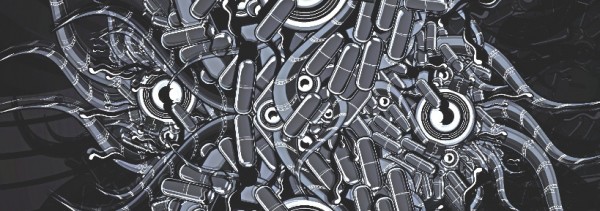
Photo: RWINA 008 artwork: Noah D “My Vitamin Pillbox Nikes” / “The Love”
Another month whizzed by, and it’s hard to find any common theme this month aside from the ever-growing diversification of bass-centered musics, or whatever the hell you want to call this stuff. Chalk it up to changing personal tastes or some actual tangible trend, but this month might have the least ‘actual dubstep’ of any of the columns past, focusing more on the house, drum’n’bass and experimental end of things than ever before. We’ve got a very prominent feature on three mindblowing Roof Light releases from this summer for our Record of the Month, along with an interview with the lovely gentleman himself, and reviews of the newest releases on esteemed labels like Hyperdub, Planet Mu, Nonplus, Berkane Sol, as well as our usual column favourites and newer labels like Saigon and Pattern. This month is loaded with the first word on several upcoming July releases as well, so have patience if you can’t snatch up everything at once — keep yer eyes peeled for eventual releases of all this stuff! [AR]
June’s edition of The Month In Dubstep & Bass was written by Andrew Ryce [AR] and Sam Olson [SO].
INTERVIEW: ROOF LIGHT | IN THE MIX: ITAL TEK
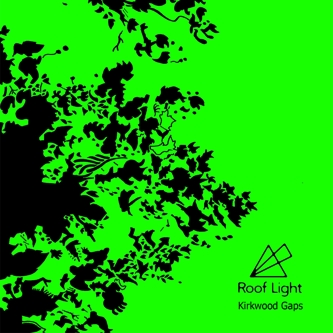
Roof Light
Kirkwood Gaps LP
+ Harlem Power EP & What Makes You Think You’re Special EP
(Highpoint Lowlife | HPLL053 & HPLL054)
(Prolific Recordings | PROPH120)
Styles: Everything good under the sun
Purchase the LP
The ‘winner’ of this month’s illustrious honour is actually three records, all released within the span of a month; three vastly different records, as it happens. But digested together they present a picture of an artist so exciting and inspired it’s hard not to shower it with superlatives. The music of Surrey’s Gareth Munday, better known of Roof Light, digests and reproduces so many of 2010’s trends and dominant influences, synthesizing them into a rhythmic vortex of encyclopedic musical knowledge and expression. His music shifts wildly from nimbly stepping UK garage to unpredictable IDM, with occasional forays into ambient and even hip-hop, but his focused and singular vision unites the most disparate strands of his work into one coherent, almost linear path.
The most prominent of these three releases is Munday’s debut LP, the enigmatic Kirkwood Gaps released on the Highpoint Lowlife label, a label whose penchant for odd, inter-genre experimentation and fertilization seems a perfect home for Roof Light’s nearly cannibalistic music. The album is Munday’s most reserved and introspective release yet, its steely beats and careful flourishes like a selfmade hauntology constructed purely from personal experience; this is the new shit. The music runs the gamut from near formless jamming to rigid and slamming, and over the course of the LP he builds confidence and character, with each cut more focused and tightly-written than the last. His influences are clearly varied and honestly quite untraceable, though it’s remarkable how similar “Kite Tails and Redwings” sounds to mid-90s Aphex Twin, like an outtake from I Care Because You Do single-handedly giving birth to UK Garage. “Daytrips and Starlight” bites on a hip-hop tip, so aggressively that it sounds like he’s trying to demolish the studio with each bass drum kick, while the trippy “Drawing Near To The Printed” refuses to settle on any one beat, cycling through drum patterns like paint samples before a Burial-esque swing crashes the party, announced by swirling synths and world-overturning bass.
The album ends with a whirlwind stretch of fluttering beats, “Hold It Back” emanating canned strings and 8-bit bleeps, while “Losing My Mind” and especially “Taro” make a credible case for a relatively successful future in British dance music for Munday, the latter’s ultra-silky chords soiled by gurgling wobbles and enthusiastic diva vocals. The album is bookended with two soundscapes, closer “Late Into The Evening” turning a perpetually dripping faucet into a dreamworld symphony and opener “Marrying Maidens Fair of Willow” stretching recordings of string instruments to their furthest extremes until they’re indistinguishable bands of silvery light. The album’s release is accompanied by a vinyl EP sampler, four more exclusive tracks not on the LP; “What Makes You So Special” immediately announces itself as separate, sirens and cushioned chords painting a liquid day-glo melody with unfussed ease. Munday flirts with hazy dub techno on “Face Up” and presents a hauntological interpretation of Todd Edwards on “Prayin to T.E.” (gee, I wonder what that stands for), where the clipped strings are caked in ancient dust and the vocals sound oddly disconnected.
The third release is an EP on MJ Cole’s underrated Prolific Recordings label; and as you might expect, just like his recent release for L2S, it’s a much more straightforward affair than the dreamy stasis of his Highpoint Lowlife work. “Harlem Power” is a beast of a track that doesn’t really open up until you wriggle your way inside of it; melding metal and wood for a head-spinning melange of percussion, affecting vocal samples are coupled with rousing chords and keys for an exercise in euphony and harmony so blissful it’s almost inspiring; impossible to describe with words, you need to hear this track and let its twisting vocals wrap around you in their warm embrace, as brief guitar samples strike like pleasingly warm, fuzzy lightning. As if spent from that first track, next two are surprisingly dubby abstractions, percussive workouts with few embellishments, showing that Roof Light can do stoic dancefloor fare as well as he can meditative thoughtful dreamscapes. The EP ends with a gorgeous, electronically-treated acoustic guitar song, expanding in volume and tenor and climaxing with wordless vocals, slide guitars bending off in the horizon like slow-motion fireworks. It’s a bewildering end to a rather straightforward EP that nicely defines the Roof Light experience; you never know what you’re going to get, but you know that it’s going to be damn impressive anyway. [AR]
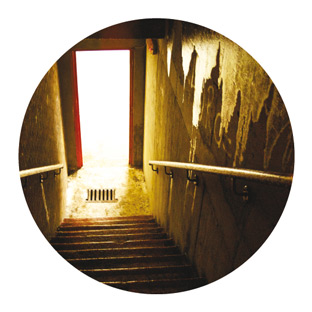
LHF
Enter In Silence EP
(Keysound Recordings | LDN018)
Styles: Umm…
Purchase at Boomkat
There’s a lot of talk and rightfully so about this bizarre and shadowy collective; cultivated myth or not, it’s hard to find much about them. An apparent group composed of like-minded individuals (?) Amen Ra, Double Helix, Low Density Matter, and possibly more, their music has a timeless ‘other’ quality to it, sounding like exotic fever dreams, impossibly foreign cultures coming to a head in the unintentionally bigoted minds of the ignorant. Their mixes for Keysound label head Martin Clark’s blog were anomalies, fusing science fiction and orientalism with a limitless feeling of astral ascension; in other words, it was music that sounded like it found on another planet in some unreadable capsule. As presented on their very first proper release, the uncoiling and detaching of their tracks has a slight demystifying effect; each track feels like a piece of a larger puzzle, like a string of proteins waiting to couple and intertwine with each other to form life. So, with this EP, we’ve essentially got tissue, tissue that needs life breathed into it — forcefully, repeatedly, and mechanically. These tracks have unpredictable rhythms that sound locked into place with iron bars — they’re unsolvable riddles, alluringly familiar but intricately complicated and confounding. The life is breathed into the tracks through the repeated use of vocal samples — sometimes singing, sometimes simply snippets of conversations, which not only lends the music its eerie sense of fetishized orientalism but also a sense of voyeurism. This music isn’t only dangerous because it’s exotic and foreign, but it’s illegal, it’s wrong. The vocals in “Broken Glass” choose Asian singers over the typical diva, a disarming effect that changes the makeup of the music entirely, without ever sounding exploitative, while “Steelz” is oddly reminiscent of that cantina scene from the first Star Wars movie, murmurs and conversations included. Most intriguing of all is Low Density Matter’s “Blue Steel,” a track whose start-stop motion and staticky hits feels more than a little like Skream’s “Minimalistix” track on Nonplus, and when mixed with that iconic “higher!” sample (recently used by Breakage to great effect) feels like LHF is reaching into our world for the first and only time, taking what they need and intuitively adapting it to fit their own unique musical language. Little do they know, theirs is far more advanced than ours ever was or will be. [AR]
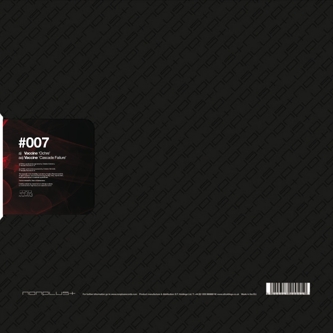
Vaccine
“Ochre” / “Cascade Failure”
(NonPlus+ | NONPLUS007)
Styles: Dubstep, Drum & Bass, Autonomic
Purchase on Boomkat
Vaccine makes her long-awaited debut on Instra:mental’s NonPlus+ label with the release of the much-hyped “Ochre,” one of the highlights on Instra:mental and dBridge’s seminal Fabriclive 50 compilation and now one of the highlights of the growing NonPlus+ catalogue. Without the mechanical precision of the Autonomic crew’s mixing, gears and pistons sliding and locking into place in the unseen underbelly between tracks, all of the holes and gaps in “Ochre” are exposed. It feels like a track in search of a groove, flailing about wildly; in the first minute or so, the percussive sounds ring out autonomously, with no bassline to tie them together and no central rhythm to work off of; when the song’s anguished vocals cry out in frustration, the chords that drift in with them contribute to the feeling of pseudo-randomness, pinging off in all directions. When the track finally hits its stride though, it absolutely kills; it has one of the most physical, deepest basslines of any recent dnb-ish track I’ve heard, something that sounds like it could easily knock entire crowds of people over and onto the floor on a really good system. It’s deliciously sinister how the track rolls forward with its clinical, almost welcoming sounds as that bassline annihilates every sign of life beneath the track’s free-floating wings. The b-side “Cascade Failure” works on a slighter tip, a mournful etude for the industrial revolution as a dying synth staggers across the track, and soft drums padded with mouldy distortion sound off into the abyss. That all sounds pretty depressing, but Christine Clements manages to find untold beauty in these melancholic symphonies. [AR]

Dokkebi Q (Kiki Hitomi)
Hardcore Cherry Bonbon LP
(3QREQ Records | 3Q003)
Styles: Dubstep, Pop, Rock
Purchase on Boomkat
Dokkebi Q is the Japanese band home to Kiki Hitomi, the quirky Japanese singer who has worked extensively with producers like Starkey and most notably King Midas Sound; you might as well take that little grain of familiarity because that’s all the friendliness you’re going to get here. Dokkebi Q’s music puts dub, jungle, dubstep, and other forms of electronic music into a woodchipper — and the obnoxiously loud, cacophonous confetti is sprinkled all over this sprawling, vaguely-psych album. For most of it, the centrepiece is unquestionably Hitomi’s wild vocals, blurring the lines between angry and sexy for a rollercoaster of emotions — whatever she is, she always sounds passionate. She sings with the curious cadence of a Japanese singer trained in dub, but on songs like “Hardcore Cherry Bonbon” or the incredible “Black Vomit,” the bizarre combination works wonders for the tracks’ stuffy, crowded beats. It’s this overcrowded, fatiguing atmosphere that makes this album sound like it was recorded in the back of some scuzzy Tokyo bar, where the quiet din threatens to overwhelm the overbearing music. “Black Vomit” is the focal point of the album, where junglist breaks are tossed across the track, recoiling into each other choppily and melting into the walls, while other tracks incorporate reggae rhythms into highly unconventional structures. If the first half the album is (relatively) approachable psych, the second half veers right off into the dark, haunted woods, the furious “English Weather Boy” uneasily rubbing up against the almost musique-concrete “Land Ahoy,” which sounds like a rock song put through a laundry wringer, coming out the other side in concentrated bursts of dripping moisture. For such difficult music, though, Hitomi’s band is surprisingly approachable — it’s got the dub rhythms, dubstep sounds and even breaks for the bass music crowd, and it’s got its unforgiving weirdness and desperate sexuality for the avant crowd. There’s no classifying this music, it’s more like a malfunctioning jukebox with an angry woman singing over it than a proper album. If that doesn’t sound appealing to you, I give up. [AR]
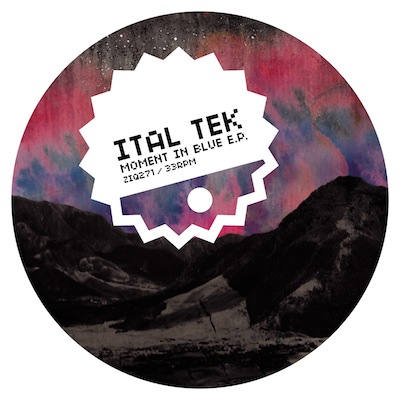
Ital Tek
Moment In Blue EP
(Planet Mu | ZIQ271)
Styles: Dubstep, Garage
Purchase link forthcoming
Two weeks after the release of his triumphant second LP, Brighton’s Ital Tek unleashes this EP, acting as the album’s de facto first single, and it’s such a mighty impressive plate that it almost makes sense that it was released after the album. The EP is centered around album standout Moment In Blue, but smartly — value for the money after all! — the original version is absent, replaced by two (or three) admittedly superior variations. Ikonika kicks the EP off with her remix, nearly overshadowing everything else in typical fashion, as she contorts the original’s music box melody into a driving melody and lays an irresistible bassline below it, upping the stutter on the vocals and creating her own 16-bit funky music. Ubiquitous remixer FaltyDL throws his own skewed garage take on the track, chopping up the riff even more and sending it straight off into digital stasis, as the vocals are recklessly pitched every which way for a delicately stepping rework, and Mr. Tek throws up his own VIP mix of the track which sees it tunneling into the depths far away from the floaty ambience of the original, flipping the track’s frequencies upside down so the bass is the focus — perhaps the way it should be. The b-sides are no slouch, “Crush Horizon” especially sounding like it would have been another standout on Midnight Colour, as filtered, neutered riffs swell beneath swooping, diving synths; “Infinity” is surprisingly aggressive, rolling forward with glinting metallic percussion and snarling bass, sounding more like the Ital Tek of old. [AR]
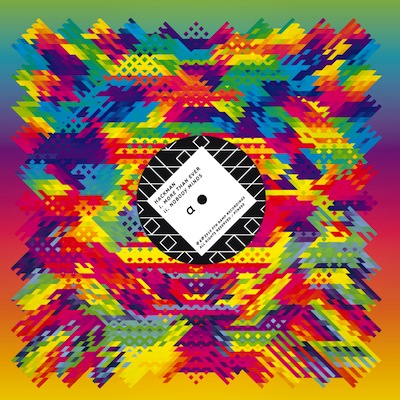
Hackman
More Than Ever EP
(Pattern | PTN002)
Styles: House
Purchase on Boomkat
British house producer Hackman is a favourite of ours, so much so that he even did a mix for us. But why do we like him? Is it because his tracks are appealingly glossy, ultra-polished, and rhythmically tight? Is it because his sounds are inventive, oddball and unpredictable? Is it because his background in dubstep lends his productions a certain low-end physicality that makes them meatier than his contemporaries? At the risk of sounding like a press release, it’s a mixture of any number of these things, and most excitingly is the rate at which his production style is growing and maturing. Maybe it’s just better mastering (thanks, Pattern), but these are the most confident and fleshed-out tracks Hackman has released yet. It’s a four-tracker so solidly built it’s hard to know the best way to enter; if you’re not paying attention the grooves’ muscular exteriors will keep you from really getting into these tunes. That’s one of the most intriguing things about Hackman’s music, it’s a masculine infiltration of very feminine-sounding music, feminine in the sense of sleek house beats and especially the vocal samples. In fact, I’d go as far to say that if weren’t for the bass riff that unleashes itself like that tumbling boulder in Indiana Jones to wreak havoc on “More Than Ever,” for example, that Hackman’s music would be polished to the point of shiny indistinguishable ennui. There are some moments here that make me wish there was another track running underneath to roughen the edges and rub some dirt off onto the stark white, but as it is they’re more than fine. “Gutterflower” takes the mallet sound of his Well Rounded EP to new heights, with the breeziest, most ecstatic vocals since Ramadanman’s “Your Words Matter” from earlier this year, and “Nobody Minds” uses some sort of whistling birdsong as its backbone, gracefully darting around the background of the track. The EP’s last track is the best, “Dusk” hinting at dubstep with growls — and something akin to a neo-disco breakdown that you’ll totally miss if you aren’t paying attention. Really, this EP is loaded with too many neat details to mention; I’ll just point out one last thing, the majestic way that Hackman stretches out the vocal in “More Than Ever” to a filmy slick that sounds just like another synth, and lets it snap back to normal seconds later — ridiculous. [AR]
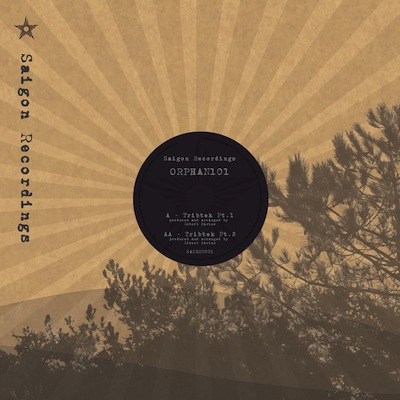
Orphan101
Tribtek EP
(Saigon Recordings | SAIGON001)
Styles: Dubstep, House, Techno
Purchase on Boomkat
Brand new Bristol imprint Saigon Recordings is headed by a familiar face in the dubstep scene, but the music they release is like nothing you’ve ever heard. Building on the brilliant mix I posted last month, the first release is from the rather mysterious Orphan101, who crafts two surging, organically pulsing workouts in what sounds like a prehistoric manmade cave. “Tribtek” is a two-part single split over two sides, with each part feeling a piece to the other but each with its own distinct identity. Part 1 is all about hollow percussion, but when it starts to build the real excitement comes along with the confusion — what is this music? A 4/4 thump emerges beneath the dubby drums as Berlin-inspired scrapes, scratches and other assorted noises pan their way across the throbbing track, and the ominous, slightly detuned faux strings that come in scream melodrama, as the percussion starts to skitter and bulge at the sides, desperately trying to escape. Part 2 is thinner and oxygen deprived, the strings starting to sputter as the percussion beats even faster; it’s where the panic really starts as the sub-rumbles threaten to topple whatever listening apparatus you’re using, and the drums pound in sync like some horrific tribal ritual. But that’s what you get for entering the jungle, isn’t it? [AR]

Ill Blu
“Bellion” / “Dragon Pop”
(Hyperdub | HDB036)
Styles: Funky, House
Purchase on Boomkat
Hyperdub makes one of its deepest strikes yet into the Funky fortress by snatching up scene legends Ill Blu for their first (!) proper release, after a string of remixes and several years of buildup on London pirate radio. As you would expect, these tracks are funky reductions, soupy beats boiled down to their smoking essences: brief, three minute chunks of pure funky making the clearest case for the genre’s familial relationship with dubstep and grime. Embedded in the jumpy rhythms and bells is trademarked Hyperdub dread, the kind of record-selling point that could be bottled and mass-produced if Goodman-Scott didn’t have the patent locked up in some high-security safe somewhere. “Bellion” hops and skips, armed with a riff so strong it can’t help but tear up the track to make its presence known, stopping it on the rails and circling around menacingly. It cuts its own path through the springy drums, driving the track as its reinforced by powerful sub-bass frequencies; it’s a more traditional-sounding funky track that sounds like it could be the manifesto for Hyperdub 2010. Until you flip it over and “Dragon Pop” plays, one of the most thrilling fusions of funky and dubstep aesthetics this side of Cooly G’s darker productions. Deep throngs of bass burrow miles underground, the elasticity crushed and made all the more intense by the almost immeasurable gravitational force and pressure. The subs support a pseudo-tribal organic drum pattern that pitters and coughs lightly, as if dancing on its tip toes to avoid the occasional white-hot geysers of bass that intermittently break through the surface. That Hyperdub was able to extract such dubby, (relatively) ruminative numbers from the funky heroes is as impressive as it might be predictable, proving that the label’s vision is still as clear and focused as it has been since day one, even as its spectrum broadens to include little snatches of bright, powerful colour here and there. [AR]
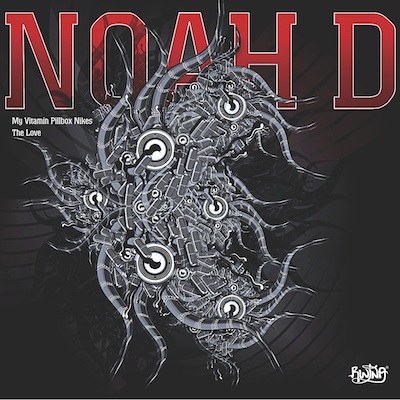
Noah D
“My Vitamin Pillbox Nikes” / “The Love”
(Rwina Records | RWINA008)
Styles: Dubstep
Not yet available for purchase
In between grimy releases like SRC’s wonderful Goin Out EP and the forthcoming Reinforced EP by Terror Danjah, Akkachar’s Rwina records steps forth with a slice of sinister dubstep from Portland, Oregon of all places. Noah D is a relatively new producer, making the majority of his reputation on the decent-sized hit “Seeerious” on that other Dutch dubstep label Subway; still in the process of making his name, his tunes are often indistinctive and unassuming. But from what is either an impressive step forward or just typically genius track selection from Akkachar, these tracks take tearout dubstep’s obsession with the grotesque to cartoonish and colourful extremes; colourful and grimy just like the rest of the Rwina catalogue, with a distinctly snarling edge. A halfstep stomper with jagged rolling riffs, the bass on “My Vitamin Pillbox Nikes” is oddly pillowy, a billowing cloud of low-end growl that diffuses rather than quakes, and synths that whine like sirens lost in the overcrowded nighttime grid of emergency vehicles signal out to classic grime. It’s an echo of young grime producers like Rude Kid who juggle grime’s original sense of melody and rhythm with the bass-driven swagger of dubstep, but coming from the other angle, from the dubstep angle. Thus, even the grimy tendencies are rather quashed and grey, something akin to a soundclash between robots. A more traditional dubstep track, flipside “The Love” oscillates a multi-limbed riff around sub-bass wobbles. It’s a constantly rotating and churning beast, glinting and reflecting light like a disco ball in slow motion. This is a release that instills a lot of hope in a name who otherwise just was another generic name in a list of solid but not great producers; maybe it’s coincidence, but this American boy has a unique perspective of grime and if he focuses his energies on it, there’ll be no stopping him. [AR]
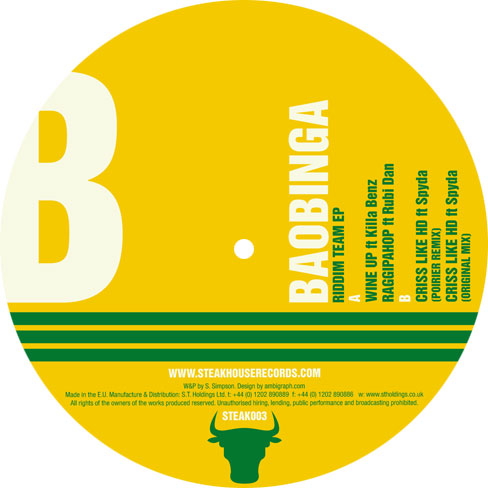
Baobinga
Riddim Team EP
(Steak House Records | STEAK003)
Styles: Dancehall, Dubstep, Funky
Purchase link unavailable
Friend of the column Baobinga is a friend of the column in so many ways. His music is usually great, which doesn’t hurt. He runs a fine label in BUILD, and he’s a genuinely nice guy. But perhaps most importantly, he’s a champion of the sort of all-encompassing umbrella classification of bass music, the kind of universal acceptance and search for new sounds that this column lives and breathes on, most actively through both his own music and his influential Bassmusic Blog. But enough with introductions, his newest release is the third on Hanuman’s quirky Steak House records, a trio of dancehall stormers backed with a remix from Montreal’s Poirier. “Wine Up” features Baobinga’s typically metallic percussion jumbles, sounding a bit like the first two Build releases only with a killer and energetic vocal from Killa Benz. Featuring Spyda, “Criss Like HD” is a forceful banger replete with dramatic orchestral hits and an impossible-to-forget chorus, and in Poirier’s hands it turns into a streamlined march, with all the curves harshly bent into a forced straight line. Its almost militaristic streak of aggression is a bit at odds with the party vibes of the rest of the EP, but it’s the kind of jam that would be a peak time destroyer, wringing out every last bit of energy from a packed, exhausted dancefloor. The best moment on the EP features the legendary Rubi Dan, for “Ragippahop,” with a beat so good the vocals ultimately feel like dressing. The track again features Baobinga’s signature lightweight titanium percussion, but during the chorus these humid bits of strings waft in, upping the pressure on the track to dangerous levels while warming what they should be cooling, until your pores are completely clogged with sweat and you can’t do anything but hope for the best. [AR]
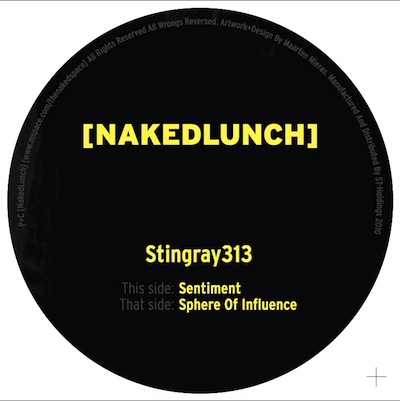
DJ Stingray
“Sphere Of Influence” / “Sentiment”
([nakedlunch] | NL006)
Styles: Techno, Drum & Bass
Purchase link unavailable
Ireland’s mysterious [nakedlunch] imprint returns after the red-light district jaunt of Instra:mental’s “Let’s Talk” with a stunning slab from Detroit’s legendary DJ Stingray, two frantically-paced tracks that rather sound like drum-n-bass played on pins and needles. These tracks are all monochrome twilight, the tiny stabs of “Sentiment” breaking out into miniscule synth riffs like fireflies gathering for a late-night mating session. “Sphere of Influence” is a tad more traditional, chugging forward like a steam-powered railway car, beats clicking like rickety wheels on rickety tracks, until the train hits a snag and launches head off into the sky and the song’s lead synth goes off on its own tangent, making a neat landing back onto the tracks and continuing as if nothing happened. It’s like a light dose of hallucinogenics, you get to fly a little bit but you make it out without a scratch; though that high-pitched ringing in “Sphere of Influence” might mangle your hearing a little bit. [AR]
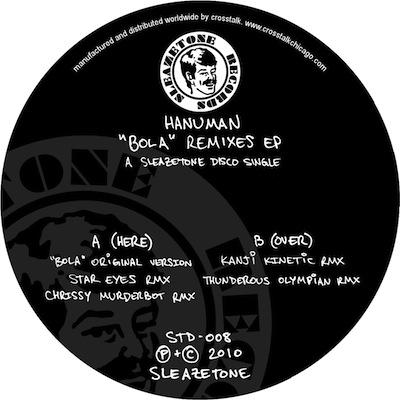
Hanuman
Bola Remixes
(Sleazetone Records | STD008)
Styles: Funky, Dubstep
Purchase on Boomkat
Hanuman (one half of Monkey Steak, who have released records on Punch Drunk and run their own label Steak House) follows up the much-loved (by us) Atki2 “Bola” remix on the Steak House 002 single with this release of the original on Chrissy Murderbot’s Sleazetone Records. Confused yet? It doesn’t matter, all you need to know is that the music’s good, right? Thankfully, it is; the original version of “Bola” has the makings of an anthem, UK funky drenched in goopy molasses — even those cheeky sirens sound like they’ve been slowed down to cough syrup levels. Given that he’s a Bristol boy, the dubstep influence creeps in a little bit (more than welcome round these parts!), with curvaceous bass drops and synths that sound a little like Digital Mystikz on helium. Supporting the track are almost too many remixes to name; label head Chrissy Murderbot jacks the speed way up for a ravey ghetto workout, giving the UK funky track a distinctly American identity transplant. Norrit carves out the centre of the tune, leaving only the bass and those high-pitched synths, and mysterious US producer Star Eyes provides the most attention-grabbing track, pulling the beats far apart to reveal previously unknown clearings and paths through the track’s originally thick percussion. The newly anorexic track is force-fed stirring string riffs (think “IRL” without the drama), and the track slowly begins to lose its original identity — the sign of a truly great remix, you know. Other remixers include Thunderous Olympian and Kanji Kinetic — yeah, this is one jam-packed twelve-inch. [AR]
INTERVIEW: ROOF LIGHT | IN THE MIX: ITAL TEK
